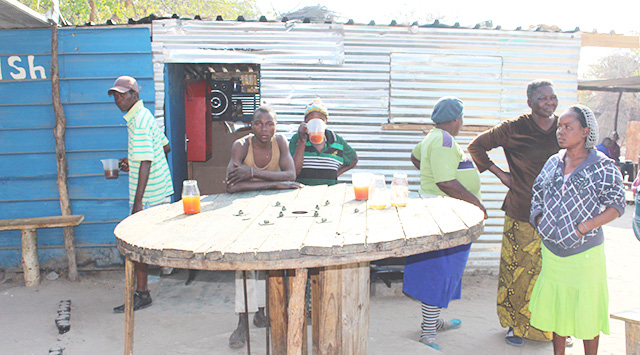CHARLOTTE NAMBADJAAT cuca shops in and around Ehafo village in Oshikoto region, patrons share a jar of home-brewed beer at sunset.
Villagers here have heard of Covid-19 on the radio, but perhaps not enough to know how the virus spreads.
Asked what Covid-19 is by this reporter, a group of patrons sitting on wooden stools burst out laughing. One man takes a guess. “It’s a flu,” he says.
Joshua Johannes (27) from the Okapuku-Ehafo village says most of the people from his village do not have enough access to mass media such as radio, television, newspapers and very few have cellphones to access social media.
“Most of the people here don’t even know what is happening around the world, nor do they understand what Covid-19 is,” said Johannes, who was sharing a jar of traditional beer with three other men, none of them wearing masks.
Despite sharing a jar and not wearing masks, tippy taps were set up at the cuca shop, as the owners made it mandatory for customers to wash their hands before entering or buying their beverages.
Although Johannes says he does not know much about the virus, he knows it is a virus that started in China and spread throughout the world and has now reached Namibia. “It does not have a cure,” he adds.
Johannes says they live in fear every day because they heard on the radio that Covid-19 cases are increasing daily.
“I am fortunate that we have a radio at home, and I heard about 700 people [at the time of this interview] are infected in Namibia. When is the cure going to be found and will it be found at all?
“We hope there will be a cure so it [virus] can end,” he says. Johannes adds that there are many elderly people who do not understand Covid-19. During this interview with Johannes, a group of curious onlookers gathered around to listen and see what was happening. A man shouted in the crowd, asking what coronavirus is.
Pordeciana Pangeiko (53) says what she knows of corona is that it is a flu.
She says she has heard some in her village suggesting that people have to drink steaming hot water with salt to keep the virus at bay, although she is not too sure if this will work.
She says she also knows that frequent hand washing and wearing masks at all times to avoid contracting the virus is crucial.
Challenges that people in her neighbourhood encounter are running water and washing hands since not every household has a tap. Even those who own taps at their homes find themselves without water sometimes, since the water closes unexpectedly due to technical problems and can be gone for two days or more, which forces people to fetch water from rivers and wells, says Pangeiko.
Twahafeni Nghinamwaami (58) says corona is a deadly virus killing people globally.
“People must adhere to the rules given to them by the government, which is always to wear a mask, wash and sanitise hands and maintain social distancing, and avoid unnecessary travelling, he says.
However, he adds that from what he has observed when running errands at Omuthiya is that many people do not wear masks or adhere to social distancing regulations.
“Masks are totally ignored in the village because only one or two people put them on. Another thing is the record taking at the entrances. Service providers are not taken seriously because some people write false information. The government should perhaps also start donating sanitisers because not everyone can afford them,” Nghinamwaami said.
During the tour around the town of Omuthiya, about 20 kilometres from Ehafo village, some security guards and employees at shops and other buildings were seen writing on behalf of those entering the shops because some could not read or write. Some also asked people to give them their identity cards to avoid misleading information.
Stay informed with The Namibian – your source for credible journalism. Get in-depth reporting and opinions for
only N$85 a month. Invest in journalism, invest in democracy –
Subscribe Now!










